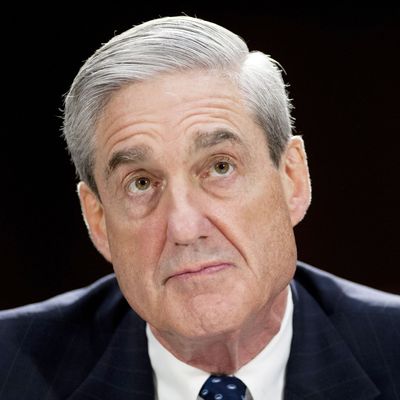
The unambiguous message emanating from the White House is that Robert Mueller has been at this a year, and it’s time for him to pack it in — or, perhaps, for his investigation to conclude in some other, less voluntary way. “We are going to try as best we can to put the message out there that it has been a year, there has been no evidence presented of collusion or obstruction, and it is about time for them to end the investigation,” says Rudy Giuliani. It’s quite strange that the official Trump line puts so much weight on the evidence Robert Mueller has publicly presented, given how tightly Mueller has held onto the secrets of his investigation, and how deliberately its public indictments have proceeded.
If his investigation had been leaking some of its revelations, we would have a lot more information about what Mueller has found. But, then, if that were true, the leaks, rather than the lack thereof, would probably be the rationale for ending his probe.
What Mueller has found can only be guessed at. The publicly accessible evidence that the Trump campaign colluded with Russia is extensive. I summarized the highlights of that evidence two weeks ago, but even since then, more evidence has appeared. A White House official reported to the Senate Judiciary Committee that, while working for the Trump campaign, he had received an email that Russia had damaging information on Hillary Clinton, and that other members of the campaign would almost certainly have been copied on it. The official, John Mashburn, did not save the email, and Senate investigators could not find it. But Mashburn has no imaginable incentive to fabricate such a detail, and an extremely strong incentive not to offer up such a confession. His testimony adds to a broader picture in which many people working for Trump potentially knew the Russians were working covertly on their behalf.
It is true, however, that Mueller has swept up a wide array of crimes that may be secondarily related to collusion with Russia, but are not direct acts of abetting Russian election interference. He has charged Paul Manafort with money laundering, and several other figures with making false statements to the FBI. When federal agents raided the home and office of Trump fixer Michael Cohen, it signaled a new phase in the investigation, homing in on a rapidly spreading web of alleged financial misdeeds by Donald Trump and his associates.
Trump’s supporters have portrayed this aspect of the investigation as a gross overreach. The raid on Michael Cohen’s office “is a major red line in [constitutional] Law,” cried Hugh Hewitt; “If this were Hillary Clinton [having her lawyer’s office raided], the ACLU would be on every TV station in America jumping up and down …” complained Alan Dershowitz. Both Hewitt and Dershowitz are lawyers who were aware, or able to learn, about Justice Department rules laying out just when and where its agents can raid a lawyer’s office, and nobody has made a credible or remotely specific case that the raid on Cohen, a fixer with a lifetime of criminal associations who only barely qualifies as a lawyer, violated attorney-client privilege either by the letter of he law or by the intent.
It is entirely possible that the investigation of Cohen is connected tightly to collusion charges. Cohen, after all, had years-long connections to the Russian underworld, conducted secret dealings with Moscow during the campaign, and was alleged by Christopher Steele to have met with Russian intelligence in Prague in the last weeks of the campaign. On the other hand, it is also possible Cohen’s dealings with Russia went nowhere.
Bu consider what we know about Cohen’s financial dealings — much of it thanks to a civil suit brought by the lawyer for one of the mistresses Trump tried to buy off. Cohen has collected vast unreported sums, which were either cash-for-access functioning as quasi-bribes or straight-out bribes. Trump, frequently working through Cohen, has built inscrutable ties to worldwide criminal sources who wash ill-gotten sums through his real estate ventures.
Meanwhile the Congress has made it perfectly clear it has no intent to investigate any of these curiosities. The House has used its investigative apparatus to hurl a continuous series of calumnies at Mueller and the FBI. The Senate has conducted an earnest but tightly constrained investigation into the foreign policy security aspect of the Russian intervention, and even that investigation has run into repeated brick walls.
Trump’s strategy of brazening out every call for disclosure, avoiding media scrutiny and answering the few shouted questions he gets with lies, has largely worked. The unstated assumption of the case that Mueller should stay away from this topic is that Trump managed to evade scrutiny of his business record during the campaign, and the campaign was the public’s one and only shot at accountability. Now the special counsel is the only force putting real pressure on the unethical and quite possibly criminal culture that Trump has nourished. What possible justification is there for Mueller to ignore this bottomless pit of sleaze?






























